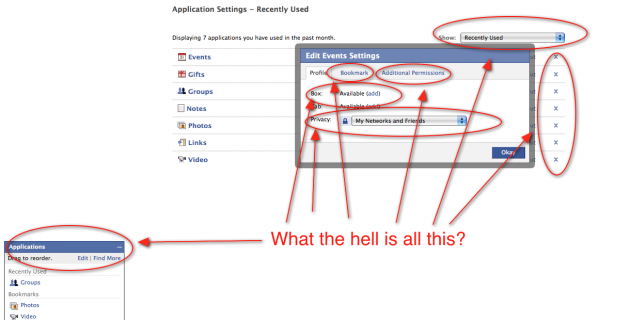 K-I-S-S: Keep It Simple, Stupid. It’s a mantra that always pops into my head when I’m looking at new startups. A lot of them seem to want to do a million different things because other companies have been successful at one of those things in the past. But that’s a bad idea. Way too many new products and services are too complicated. And I would suggest, often fail as a direct result of that.
K-I-S-S: Keep It Simple, Stupid. It’s a mantra that always pops into my head when I’m looking at new startups. A lot of them seem to want to do a million different things because other companies have been successful at one of those things in the past. But that’s a bad idea. Way too many new products and services are too complicated. And I would suggest, often fail as a direct result of that.
On the face of it, it makes sense to give users a lot of options when it comes to features, and let them decide what to use and what not to use. But decisions can be a burden. And further, users are often bad decision makers. It may be blasphemy to say that users want to be told what to do, but at the very least, they want to be lead in a direction.
And that’s important. Because it’s not like a lack of decisions has to be limiting. Take, yes, Twitter, for example. It started out as a service meant to share what you are doing in 140 characters or less. But it quickly evolved well beyond that — into something that the creators never intended. Messages to other users, links to interesting articles, disaster reports — these all go way beyond simply saying what you are doing, but they still work within the parameters set by the creators.
Since its inception, some people have been saying Twitter is silly. Those people aren’t necessarily wrong, but even they must admit that it has done one thing very right: Keeping the service simple. How many calls have there been to add this feature, or add that one? We’ve all done it. Yet Twitter (yes, perhaps aided by the fact that it lacked the spare engineers in the early days during its constant crashes), stayed the course and kept its product extremely simple.
That, in turn, has led to an entire ecosystem of third party applications that now run on top of it. And Twitter, the little service that everyone was calling silly just a couple years ago, is now clearly having a direct effect on huge web services — like Facebook.
Let’s talk about Facebook for a second. The number one reason I started using Facebook rather than MySpace several years ago is that it was so much neater, cleaner — yes, simpler. But with an explosion in growth, came an explosion in features. And, in turn, an explosion in complexity.
I’d argue that’s one reason why we see so much backlash when Facebook makes design tweaks nowadays. It really is pretty hard to master using Facebook, and a lot of users (and developers) have put a lot of time into just that, only to have the rug pulled out from under them with some fundamental changes.
These changes require more work be put in to learning the system again, and that takes away from Facebook’s core value: Using its network to find information about your friends. Not surprisingly, that pisses people off.
 On a much larger scale, I’d argue that it’s the same trap Windows falls into. Microsoft simply cannot fundamentally change it too much — even though plenty of people would argue that it probably should — because people would go wild. We saw this happen a bit with some core changes in Vista — though, to be fair, Vista’s performance I think hurt it more than anything else.
On a much larger scale, I’d argue that it’s the same trap Windows falls into. Microsoft simply cannot fundamentally change it too much — even though plenty of people would argue that it probably should — because people would go wild. We saw this happen a bit with some core changes in Vista — though, to be fair, Vista’s performance I think hurt it more than anything else.
Instead, Microsoft is stuck in the cycle of adding new features to a product that is pretty much the same as it’s been for at least a decade, if not longer. New features placate some users, but ultimately, that cycle is a losing proposition. And Microsoft makes it worse by offering a bunch of variations of a similar product where it’s not really clear what the real differences are.
If you must add new features, I think a much better approach is the one Gmail recently began taking with Gmail Labs. Rather than roll out new features to everyone while it waits for the inevitable backlash, Google makes them opt-in only, through Labs. This way, it really is the user’s fault if they don’t like the change — and more importantly, it’s easily fixable. Simply turn off the feature you don’t like.
But let’s go back to the core of simplicity. Simplicity can often mean beauty. Just look at what Atebits has made with Tweetie, a very simple Twitter client for the iPhone and now for the Mac. There were plenty of other Twitter clients out there first, but Tweetie, in my opinion, is much nicer because it’s simple. It’s not trying to do too much. It’s not trying to pull in my Flickr feed and my Facebook feed. It does one thing — and it does that one thing very well.
Another example is Instapaper, the web bookmarking service I use several times a day. Here’s how it works: You drag a bookmarklet to your toolbar, then when you find something you want to read later, you click it. Done. You don’t even need a password if you don’t want one. That’s brilliant because it means I don’t have to keep signing in over and over and over and over again as I do with a service like Delicious. Do I care if people know what I’m reading? No, I couldn’t care less. That password is a burden for the service.
Instapaper’s creator Marco Arment was smart enough to realize that even though there were plenty of bookmarking services out there first, he didn’t need to match them feature for feature. All he needed was to make something that is very good at what it does. He did, and in the process has eliminated the once dominant Delicious from my life.
Going back to Facebook for a second, its most recent redesign was on some levels an attempt to simplify things; to make its stream more Twitter-like. The problem is that Facebook is a series of complicated rules and relationships beneath that, which makes its simplicity just a facade that gets exposed when you start really looking at it. Just try changing the apps that can post to your profile stream. Go ahead, I dare you. I say that because it’s a nightmare of switches and levers. If Facebook really wants to simplify things, it’s going to need to change a hell of a lot more than its main feed stream.
Another service, FriendFeed, also recently redesigned its site (the beta version), to make things simpler. I think they did a good job of it. And while some people did not like it at first, most seem to like it now. While it’s not actually all that much different (aside from the real-time data flow), it looks cleaner, and they made it easier to follow what you’re supposed to be doing.
One of the applications that has recently been added to my regular rotation is FourSquare. Why? Well, mostly because my friends use it. But why do they use it? Because it’s simple. On its iPhone app, it takes two clicks to check in at a place. Or you can send a text to do it. Why do people like Digg? It’s simple. You can submit something. Or you can just vote. Or you can just read.
I think that for most startups, I should be able to describe to you, the reader, exactly what a service does in one sentence. Sure, you may think the service is stupid (like plenty of you still do with Twitter), but at least I can easily explain its core functionality. With some startups today, it seems like it’s a mess of “well, it’s this plus this minus this with a little of this if you do this.”
One kickass feature far outweighs a dozen half-assed ones. Focus on that one.































Comment